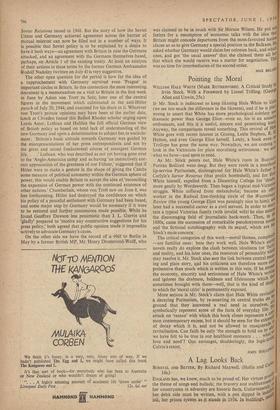Pointing the Moral
IF Mr. Stock is indiscreet to keep likening Hale White to Grid° (we see too much the difference in the likeness), and if he is plain wrong to assert that White has more psychological subtlety and dramatic power than George Eliot—even so, his is an amiable enthusiasm, and this is a useful, sincere and penetrating boo' Anyway, the comparisons reveal something. This revival of Hale White goes with recent interest in Gissing, Leslie Stephen, R• 14' Hutton, and even George Eliot herself. Lately, a book even oP Trollope has gone the same way. Nowadays, we are coming 1,(1 look in the Victorians for plain moralising seriousness : we sec' what we have—and seem to need. As Mr. Stock points out, Hale White's roots in BunY3111 Puritan Bedford went deep. But they were roots in a moribtd lip-service Puritanism, disintegrated for Hale White's father Carlyle's Sartor Resartus (that prolix bombshell), and for Hal White himself, expelled from a Dissenting College for `dolibl' more gently by Wordsworth. Then began a typical mid-Victoria° struggle. White suffered from melancholia; became an
010
worker in the Radical free-thinking circle of the W estnntale; Review (the young George Eliot was passingly nice to him); acv later had a successful career as a civil servant. In order to rrOi°. tain a typical Victorian family (with invalid wife) he also enterd the discouraging field of journalistic hack-work. Then, in tie 1880s, came the succession of remarkable pseudonymous novel5' and the fictional autobiography with its sequel, which are 1■11' Stock's main concern.
The critical categories of this work—moral 'themes, complex —are familiar ones: here they work well. Hale White's el Irritt novels really do explore the clash between idealisms (or and reality, and his later ones, the resources of personality wh.,,i° may resolve it. Mr. Stock also sees the link between central rrleaP,' ing and plain story, and his criticisms are therefore more c°j; prehensive than much which is written in this vein. If he strew the economy, sincerity and seriousness of Hale White's vvri
thel and ignores the drabness, baldness and lifelessness which sometimes brought with them—well, that is the kind of da to which the 'moral critic' is permanently exposed. More serious is Mr. Stock's claim that Hale White revitalisd
a decaying Puritanism, by re-asserting its central truths on and ground that they answered a real need in ourselves, symbolically represent some of the facts Of everyday life. attack on 'reason' with which this book closes represents a CO mon contemporary excess, but it should be seen for the extren''' of decay which it is, and not be allowed to masquerad° revitalisation. Can faith be only 'the strength to hold on to '11° at °I
we have felt to be true in our healthiest moments . . . w- h
love and need'? One envisages, shudderingly, the logic-10 Calvin's retort. •
JOHN 001


































 Previous page
Previous page